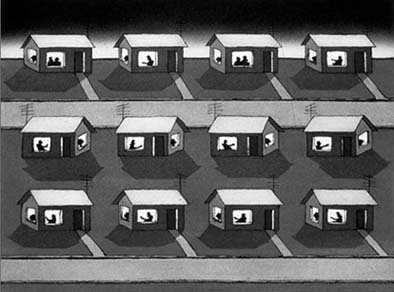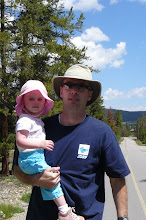The response continues...
Friday, February 03, 2006 by niebuhrian
No one knows truly how this relationship plays out. All I offer is one person's attempt to reconcile God will the pervasive evil in this world. That said, I appreciate all of the comments and careful critique of my thoughts. It helps me clarify the road I am taking and makes the journey all that much more fun. It also gives me the opportunity to test and write out my ideas in relationship to the wonderful thoughts and question you pose. So... Here we go again!
Bad Alice wrote the following:
Let me play devil's advocate. If God created us and lets us operate in perfect free will, it seems that he could also have created other beings with the same option. I tend to cringe when anyone talks about 'spiritual warfare,' but sometimes it seems as if there is more than self-interest at work in some of the most grotesque manifestations of evil. Also, if there is a spirit realm why wouldn't it contain evil forces as well as good forces? And if there isn't a spirit realm, why not?
Thanks for such thought-provoking posts. Boy am I glad there's someone willing to do all the philosophical legwork--I don't think I could get through a book on process theology.
First off, since I don't believe in a "Devil," I wonder if we will have to find another term for it ;).
My take on what I would term "senseless evil," or that evil that seems beyond self interest, is that it is a search for purity in a world of beauty. I am still working out this concept, but it has to do with aesthetics and the idea that optimal perception of the world is found in beauty - the contrast between what is and what could be in a unified object, rather than found in purity - the quest to attain one particular pole in a polemic at the expense of the other.
Like I said, I am still developing the concept, but it plays out in this way - Hitler, the instigator of probably the single most "senseless evil" event in the world, was on a search for purity in the German race, therefore he went to any length possible in order to insure that optimal conditions for purity could arise by exterminating those things he found unpure. A more recent example, though on a smaller scale, would be in extremist religious factions like the Taliban or even Pat Robertson and Jerry Falwell (Yes, I did just equate Falwell and Robertson with the Taliban. The hate that these to preachers inspire is worthy of the comparison). Their search for purity in a morally ambiguous world is misguided and ends up producing more harm than good. The religious views they espouse harm other people which is inexcusable and unnecessary.
As to spiritual warfare, yes it seems as though God could have created other beings with perfect free will, even those of a spiritual nature. However, we have no evidence, biblical or otherwise of such a creation, literally or figuratively. We have "sons of God" as the only other "human-like" created beings. Almost all ideas of spiritual warfare are out of literature, Milton especially. His work is the reason why we place "Satan" in the Garden, rather than reading what is actually there. His work is where we garner this idea of spiritual warfare, of "sons of God" who turn and wage war against heaven. It is his work that feeds our imagination when it comes to the battle over our souls.
Moreover, I would say that these "sons of God," whatever they are do not have the free will we associate with humanity. We are unique in that right and responsibility. For me, this comes down to the nature of God again. If we posit, as I have, that God is good, then could God create beings of an entirely evil make-up, such as we attribute to "evil forces?" And if God could or did create such beings, would that logically negate God's goodness? Nothing in the literature that we produce on the Spiritual realm says that a "demonic force" can be redeemed, therefore, they have no choice but to be evil and then must have been created that way. The result of this is that God is good and evil because God has placed beings that interact in this world in only a context of evil. God is therefore responsible for the evil in this world. I am not yet willing to make that claim, nor do I believe I ever will be able to make it.
But it is a nice segway into Malcolm's comments:
I think it's time for you to try a Jungian perspective. James Hillman's Kinds of Power and Carl Jung's Answer to Job are both excellent sources, and they don't overlap. In the mystery of it all Jung really stretches me to conceive that God is in fact ultimately responsible for the evil. That thought is problematic only if I think of it in a willful way -- that is, God's willfully creating evil. If I think of it in a willing way, as in God was/is willing to allow evil, then it's a different matter. God is willing for evil to be, I think, because that's the only way we as human's capable of responding to his love can be free to do so.
[The willing/willful distinction, by the way, I owe to Gerald May, he defining sin as willfulness. Which reminds me of something else -- John McQuarrie (sp?) a British theologian, defined God as "He who lets be."
Malcolm, I do so miss the days when you and I sat in a mall food court over Chik-fil-a and found meaning in our theological struggles and triumphs. I long for that kind of connection with someone out here and remember our times together fondly.
As you know I am nowhere near the Jungian scholar that you are. I know very little of his theory and what I remember, I like. The concept that sticks out, and I could be misusing it here is the shadow self. That part of the self that is capable of misusing our humanity and abusing the possibilities before us. I would agree with everything you said, except for one point - that God is ultimately responsible for evil. I am still not sure I want to go that far. I am willing to say that God gives us perfect free will, which can result in our making choices that result in evil outcomes.
The question then becomes (for me at least) is God indictable for the decisions we make as individuals who have not been coerced into making one particular decision among many possibilities?
Am I indictable if you decide to murder your neighbor? As a friend of yours who has a personal relationship with you, it would not be my fault that you committed the crime. However, to a lesser extent, there could have been decisions that I could have made that might have helped you arrive at a different outcome. Fault would fall to me, only if I made you believe that your only possibility was murder. I am still not quite sure about this rationale, what do you think?
Malcolm and Bad Alice, thank you for your thoughtful comments and questions. As I continue to read and "converse" it is helpful to have others on the journey who can offer different points of view. I thought the two of you might be interested in a couple of resources. They are not quite the light reading that some enjoy, but they have had a small impact on what you have mentioned here and I thought of these authors when I read your comments:
Kathleen A. Sands, a new author to me, has written a book entitled Escape from Paradise where she discusses evil as competing goods. She is a feminist theologian who whose take on evil is unique and challenging, but I believe that there is a lot of merit to how she chooses to discuss evil and tragedy.
John Hicks is a theologian who writes a theodicy of protest. His article in a book entitled Encountering Evil by Stephen Davis is short but challenges the assumption that God is good and he believes that God is ultimately indictable for the evil in the world.
These are not easy reads, but judging from the thoughtful comments and poignant questions you have offered they might be helpful in the long run. Thanks again
grace and peace



